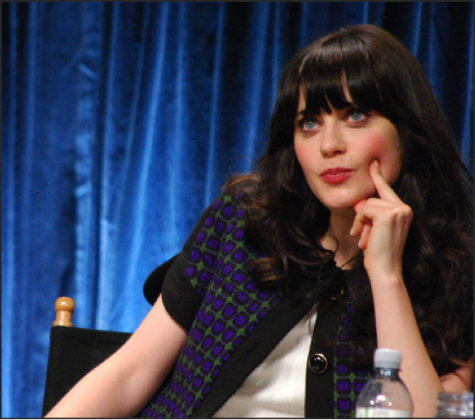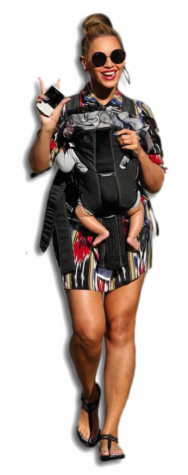Feminizing the Famous
November 13, 2014
“Are you a feminist?” appears to be the new buzz question thrown in interviews with celebrities such as Katy Perry and Taylor Swift.
The reason for all the hype in the media recently appears to stem from the age-old negative connotation of the word feminism; this connotation often keeps those in the spotlight from wanting to associate with the movement.

FEMINIST – Actress Zooey Deschanel has stated she is a feminist.
In an October article by Christina Pesoli of The Huffington Post titled “Feminism: You’re Doing It Wrong,” Pesoli addresses not only the celebrities who have found themselves faced with the F-word, but the reporters and bloggers responsible for making it so prevalent in recent media.
In her article, Pesoli shames those unwilling to admit their ignorance on the topic and those who seemingly take advantage of certain people’s ignorance.
“Feminism, as a concept, means gender equality in having access to pursue goals and opportunities across the life course,” assistant professor of Sociology, Pam McMullin said.
A rather popular definition, quoted by multiple members of The CWU Feminist Club, comes from the famous pop star, Beyoncé, who defines a feminist as “a person who believes in the social, political, and economic equality of the sexes.”
Ben Freeman, senior and physics and math major, believes celebrities probably do not want to be associated with the term due to a societal misunderstanding. Many people believe that feminists are “man-haters,” while the definition would say otherwise.
Back in May, actress Shailene Woodley told press she was not a feminist stating her reason being that she did not dislike men.
“I’d say for the general populace, they do have this idea that feminists are 80s women who are burning bras and hunting down men in the street,” Freeman said.
Lately many celebrities have been coming out as feminists.
English professor Ruthi Erdman sees a feminism-positive change happening on the red carpet.
Erdman mentions a clip recently released by the White House which features President Obama, Vice President Biden, Daniel Craig, Seth Meyers and Steve Carell raising awareness of sex-based violence against women.
In September, Emma Watson gave a speech on feminism and gender issues at the U.N. headquarters in New York. Watson’s speech launched the “HeforShe” campaign, which is a movement to recruit 1 billion males as advocates for the inequality women face.
“Thankfully, we’re finally starting to hear more feminist perspectives from some prominent celebrities,” Erdman said. “I’m hoping maybe the tide is turning against sexism.”
Senior and primate behavior and ecology, and anthropology major, Sara Perdue, believes much of the confusion surrounding the definition is derived from the variety of the members within the movement.
“I can kind of understand because there is a spectrum of feminism,” Perdue said. “There are people who identify as feminists who are misandrist and hate men and there’s also the side that’s just a little more moderate [and] want equality.”
Perdue is the secretary of the CWU Feminist Club.
On the topic of Pesoli and her article, she suggests that perhaps the media shouldn’t be asking these kinds of questions.
With the “spectrum of feminism” and its connotations, the fairness of asking celebrities to categorize themselves and offer up their political views has been called into question.
Students seem to have mixed opinions on whether or not those frequently in the public eye should educate themselves on current issues or be answering these questions at all.
“It’s kind of nice to have a shift in questions towards celebrities that have gone away from ‘Do you want kids? How do you balance it? How do you have it all?’” senior communications and French major, Elissa Griffin, said.
Griffin is the president of the CWU Feminist Club.
Though many people do appear interested in how their favorite celebrities view certain issues, the problem lies in those who speak on issues they do not seem to know much about.
For those who identify as feminist, one of these issues is feminism.
“These people are role models and they clearly don’t understand what feminism is, so either educate yourself about it, or read a little bit about it or don’t make a statement about it,” Perdue said. “You don’t have to say ‘oh, I’m not a feminist,’ you could just say ‘I don’t really know very much about feminism, so I don’t want to say I’m one or the other.’”
Josh Osborn, senior political science major, sees the question itself being addressed to the likes of actors, actresses and musicians as odd.
“It’s kind of like Miss America pageants where we ask all of these important political questions about ISIS to Miss Wyoming and Miss Colorado,” Osborn said, “but that’s not what they’re there for. That’s not their specialty.”
The conversation of celebrity involvement in politics comes rather full circle when thinking of not only how celebrities can affect their audiences, but how being more politically open could affect their careers.
Osborn believes the answer to the feminism question depends on the celebrity.
“Specifically, when it comes to women, like Katy Perry is a pop icon and she has a much larger following, she is more likely to present a view that’s non-confrontational because she wants to continue to appeal to everybody,” Osborn said. “Whereas someone like Zooey Deschanel, she’s indie, she’s quirky, she has that reputation and that kind of fan base, she’s able to say something like: ‘I’m a fucking feminist,’ because it’s part of how people characterize her. […] We characterize their views kind of based off of where they are in celebrity culture.”
Some seem to have decided that their beliefs or ideas are too important to not share, whereas others still want to keep their politics at home and soley their talents in the spotlight. Feminism is the hip new political buzz word of today, echoing down the red carpet and into the minds of audiences everywhere.
“I think that celebrities, they definitely influence how people view feminism, but they are also a good way to see how society currently views feminism,” Osborn said.


